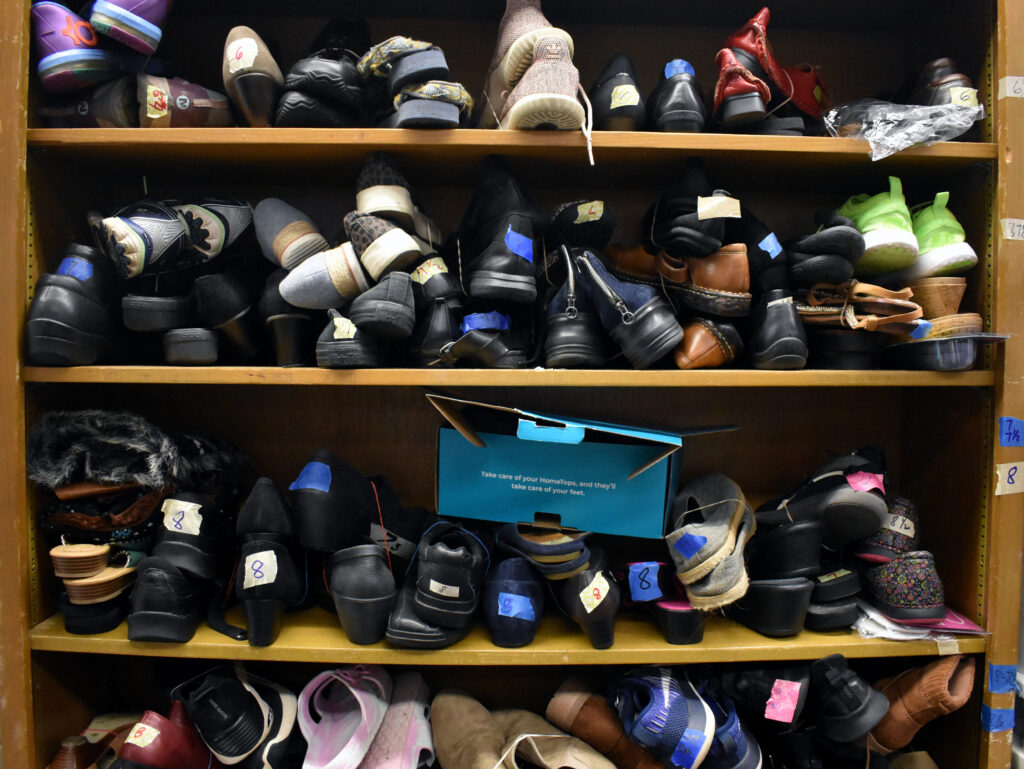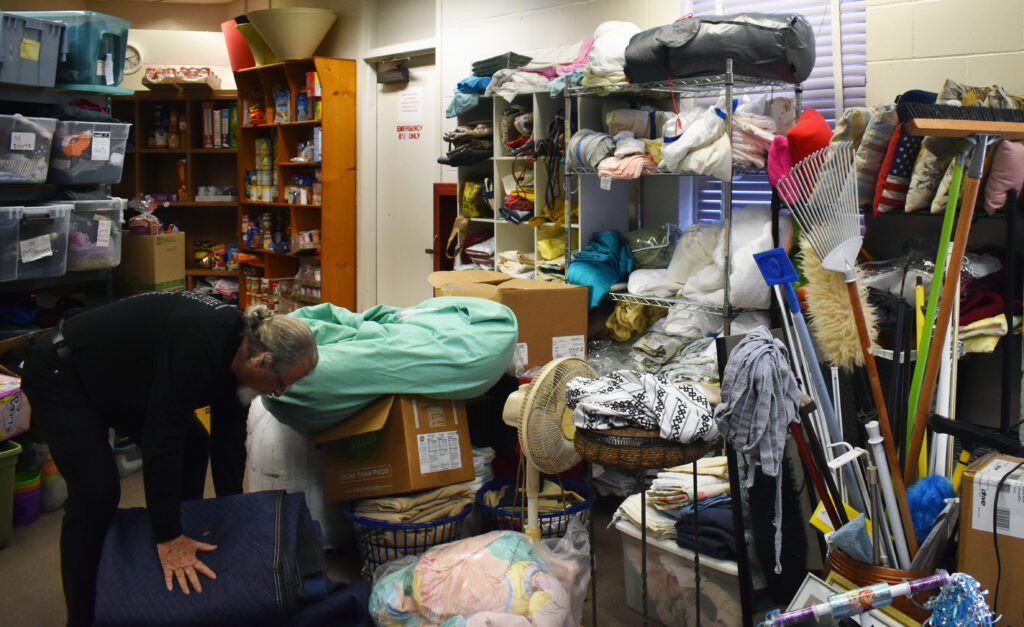
Yossie and Louise Yariv sit on the flatbed of their truck containing a couch and office chair just before a delivery on Wednesday, April 24, 2024, in Gainesville.
August 9, 2024 | story and photos by Lauren Whiddon
It was 1999, and Louise Yariv was teaching English for Speakers of Other Languages (ESOL) at Gainesville High School. Her classroom was cozy — filled with sofas, loveseats and armchairs rather than desks. She wanted her students to feel comfortable and at home.
One of Louise’s students was moving back to Brazil. The family had a couch they couldn’t take along.
“Do you want it?” he asked her.
Since her classroom already had plenty of furniture, she turned to the class. She asked if any of the students needed it. To her surprise, many hands shot up.
Louise realized something: Maybe these students and their families have needs that we have no idea about, she thought to herself. The Gainesville High School ESOL Closet was born.

Donated shoes are stacked up on shelves and organized by size in the ESOL Closet.
A quarter century later, the ESOL Closet endures at Gainesville High. Louise retired from teaching after 23 years, but she couldn’t retire from helping people in need. She still runs the nonprofit, which takes donations of furniture, towels, appliances, soaps, shampoos, clothing, food and other household necessities. They are available to anyone in the community who may need help. Recipients include immigrant families, abused women, unhoused families, veterans and graduate students.
Louise proudly wears the purple and white colors of her former high school mascot, the Hurricanes. She sports purple glasses, a violet lanyard and a plum-colored T-shirt, perfectly matching the school’s logo. Her husband, Yossie Yariv, helps her run the ESOL Closet.
Louise and Yossie met in 1976 in New York, where Louise grew up. She had Israeli cousins who came to visit on a program with the Israeli Air Force during the holidays. Yossie was a part of the group. They fell in love and eloped four months later, in March of 1977. He returned to Israel, and weeks later, Louise went too. They lived in Kfar Yehoshua for six of their eight years in Israel, until Yossie’s studies brought them to Florida.
In the late 80s, when they were in their 30s, they moved to Gainesville so he could pursue an electrical engineering degree. He went on to work at Gainesville Regional Utilities. Louise landed what she describes as her dream job as an ESOL teacher at Gainesville High.
Over her 39 years of teaching, ESOL has always been the highlight. She wanted students to understand that if they could become bilingual and bicultural, there would be no limit to what they could do.
At Gainesville High School, she strived to be comforting and caring. In addition to the couches, her classroom was always stocked with tissue boxes for when students needed a safe place to cry.
For some students, Louise’s support was concrete. She would pitch in for utilities or rent. Some students even moved in with Louise and Yossie while they were in school.
Sheyla Culque immigrated from Peru to Gainesville in 2012 and attended Gainesville High. She wasn’t dying to learn English but knew she needed to.
“You had no other choice,” Culque remembers, “especially in her class.”
Years later, Culque was surprised to find out that Louise spoke Spanish. Louise never spoke to students in Spanish during class. She always encouraged them to speak and write in English.
Without Louise, things would have been far harder, said Culque, who still owns the bedroom set she picked up from the ESOL Closet eight years ago. Louise’s classroom was a place where students went for lunch and could be comfortable with other non-native English speakers. Although many of her students were from different countries, they could all relate their experience as immigrants.
Walking into Louise’s classroom was like walking into a home, Culque said. If you knew Louise, she said, you also knew Yossie. The two are always together.
Yossie became a great “ESOL dad” to the students, Louise said. Many of the relationships they built exceeded their students’ four years of high school. The two are still in contact with many of their former students today.
Many people find the ESOL Closet through Facebook, Nextdoor or word of mouth. Anyone can call Louise and Yossie to let them know they have a donation. The couple will come pick it up.

Yossie Yariv rolls up a moving blanket in the ESOL Closet.
In addition to social media, Louise and Yossie credit the Closet’s steady growth to their timeliness. They typically get two to three calls a day for pickups. But when they do, they go right away — even if they’ve just sat down for dinner.
In the first year, they had about 60 donations. Twenty four years later, they had almost 1,000.
They use a pickup truck, and on rainy days a minivan, for pickups. At times, they bundle their blue and red pickup bed so high with furniture that they remind their neighbors of The Beverly Hillbillies.
They are on their second pickup truck. The first was donated to them in 2006 by a former coworker of Yossie’s. It lasted for 11 years and made pickups and deliveries much easier. Before that truck, they would drive to a friend’s house, borrow their truck, pick up the donation, deliver it, return the truck, get their car and drive home. This truck was one of the donations that made the biggest impact on the ESOL Closet.
Yet it wasn’t the most surprising. One unexpected donation was a gun they found inside of a boot and immediately turned into the police. Another unforeseen donation came when a man donated his ex-wife’s mother’s ashes in an urn. The ashes were spread respectfully, and the urn given to a family in need.
One time, Louise and Yossie picked up donations from a college student who was moving out. They didn’t get very far and before the girl called again. She had overestimated the space in her car and asked if they could come back for more things she couldn’t take home. They promptly turned around.
Typically, a UF mother calls on their student’s behalf about picking up excess dorm furniture.
It makes Louise chuckle, remembering how when she was a student at the University of Wisconsin-Madison she was allowed to bring only a stereo.
The general rule for donations is that they need to be free of rips, stains or tears. Louise’s guideline: If you would give it to your mother or your sister, you can donate it to the ESOL Closet. It’s important for Louise and Yossie that people have pride in what they take home.
Once Louise and Yossie pick up the donations, they bring them to the red brick high school on Northwest 13th Street, and neatly organize the goods with masking tape and a handwritten label.
The Closet itself isn’t a closet – it’s expanded to two full rooms in the high school.
When you enter the first room, to your left are shelves with a rainbow of children’s books in English and Spanish, cleaning supplies, lampshades and personal care items like soaps and curl cream. To your right are brooms, rakes and dusters.
Then come shelves of clothes organized by size and ranging from newborn, toddler, children and adult clothes, including professional attire. Pillows are neatly tucked in line next to folded bedding labeled by size.
Next to the clothing shelf are snack and pantry items like Cheerios, peanut butter, Campbell’s soup and cupcake mix.
Stuffed animals wait for new owners in storage containers, with the cutest sitting at the top. There are sets of mugs and glasses, plates, sippy cups and strainers. There is a dresser full of shoes with shelves stacked three pairs high. Each shoe has an inch of masking tape with the size stuck on the heel. The organization is meticulous. It needs to be to avoid chaos in such a valuable space for so many people.
Outside the first room, in front of green and blue lockers, stands a crib waiting to be primed for a new baby and new home. The second room contains bigger furniture like mattresses, a refrigerator, freezers, a table and chair.
Here is where people in need can make appointments to come by and see what’s available. They can only come to the Closet after school or on weekends, but pickups go on all day long.

Louise Yariv displays her organization system for donated clothes in the ESOL Closet
Once a family has come by to browse what furniture or other items they need, Yossie and Louise will deliver it, although after 25 years, they can no longer carry the furniture inside people’s homes.
Over three months in spring 2024, they had scheduled 212 total deliveries, pickups and appointments to “shop” at the closet. Each gets its own page in the violet notebook Louise keeps in her purple patterned Vera Bradley backpack, along with her lilac binder-clipped planner.
Despite their packed schedule, Louise and Yossie make time for themselves. They cat-sit for a former student in Washington, D.C. They volunteer with the Friends of the Library. They love bike rides and visiting family in New York and Israel. They travel and visit former students. In October, they reunited with seven former students in Europe. They are happy with the balance in their lives, she said.
The ESOL Closet works so well in part thanks to the network of support Yossie and Louise have built in Gainesville. Some of the heavy lifters include school staff and administration at Gainesville High School and partnerships with local organizations like The Repurpose Project, Buy Nothing Gainesville, the Rotary Club, Bread of the Mighty Food Bank, Oak Hammock and Auto Plaza, owned by a former student who helps fix up their truck.
“We have to fight him about paying,” Louise said.
Such camaraderie among businesses, volunteers and organizations is a defining characteristic of Gainesville. Locals are often eager to help each other out. Moreover, such programs are crucial in a city where economic disparities divide its residents.
Gainesville is marked by significant income inequality and has a 28.2% poverty rate, according to the U.S. Census. In west Gainesville, you could take a 0.8-mile drive for four minutes from a Target to a Whole Foods and pass two Publix’s, a Trader Joe’s, a Walmart and dozens of restaurants. If you drive 15 minutes east, you’d be in a food desert.
“I think there are a lot of people who barely know that there’s a university here,” Louise said. “And on the other hand, I think there are people who have no clue the levels of poverty that exist in Gainesville or in Alachua County.”
As Yossie and Louise get older, the ESOL Closet continues to run with support from former students who live in Gainesville. They remember how the ESOL Closet helped them and want to continue to pay it forward.
“It’s wonderful to see what they have become and the feedback we get from them,” Louise said.
On one of their international vacations six years ago, while in Brazil, the couple had lunch with the student who gave them the original couch.
“You have no idea what you started,” they told him, “by donating that couch to us.”